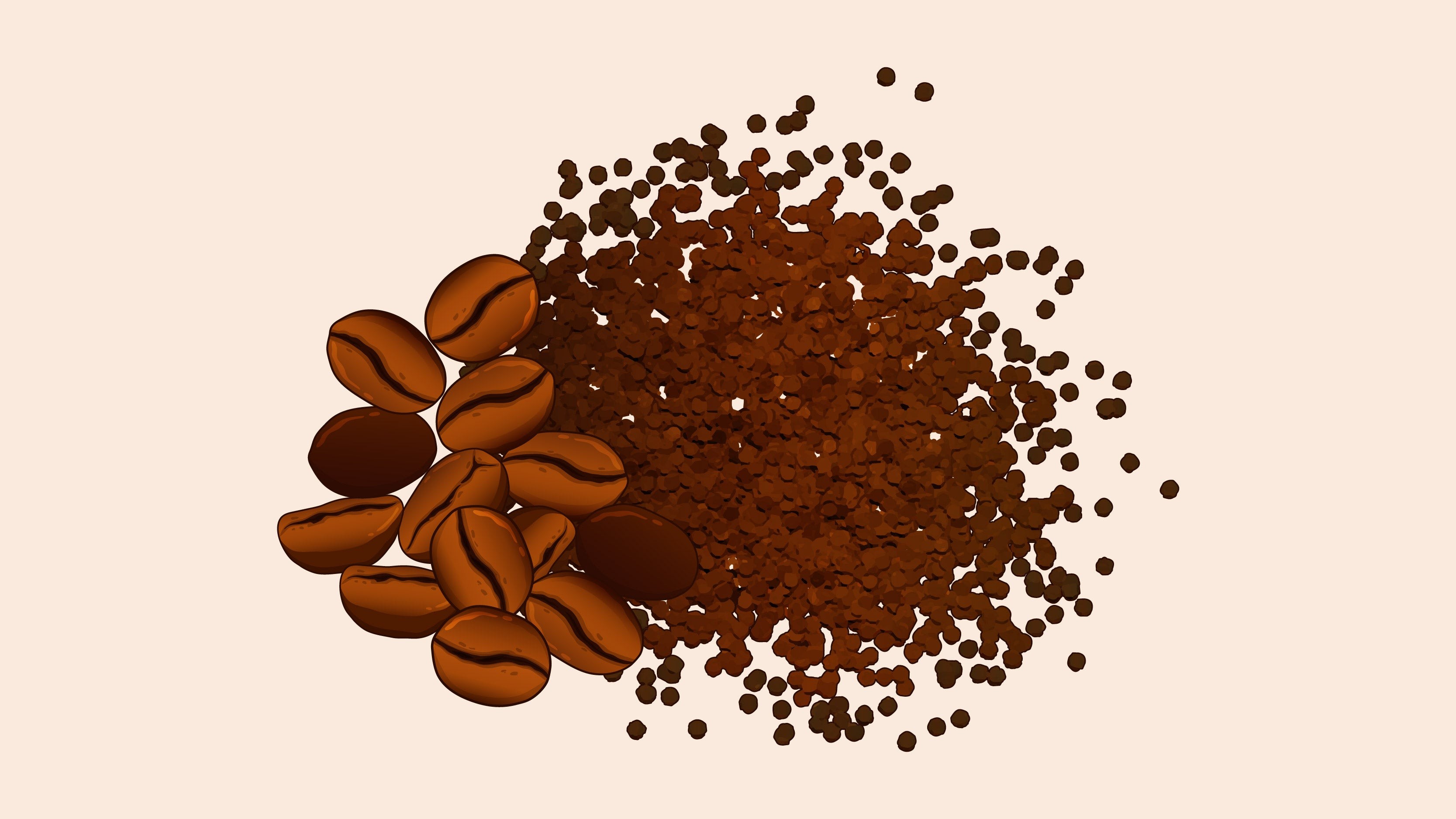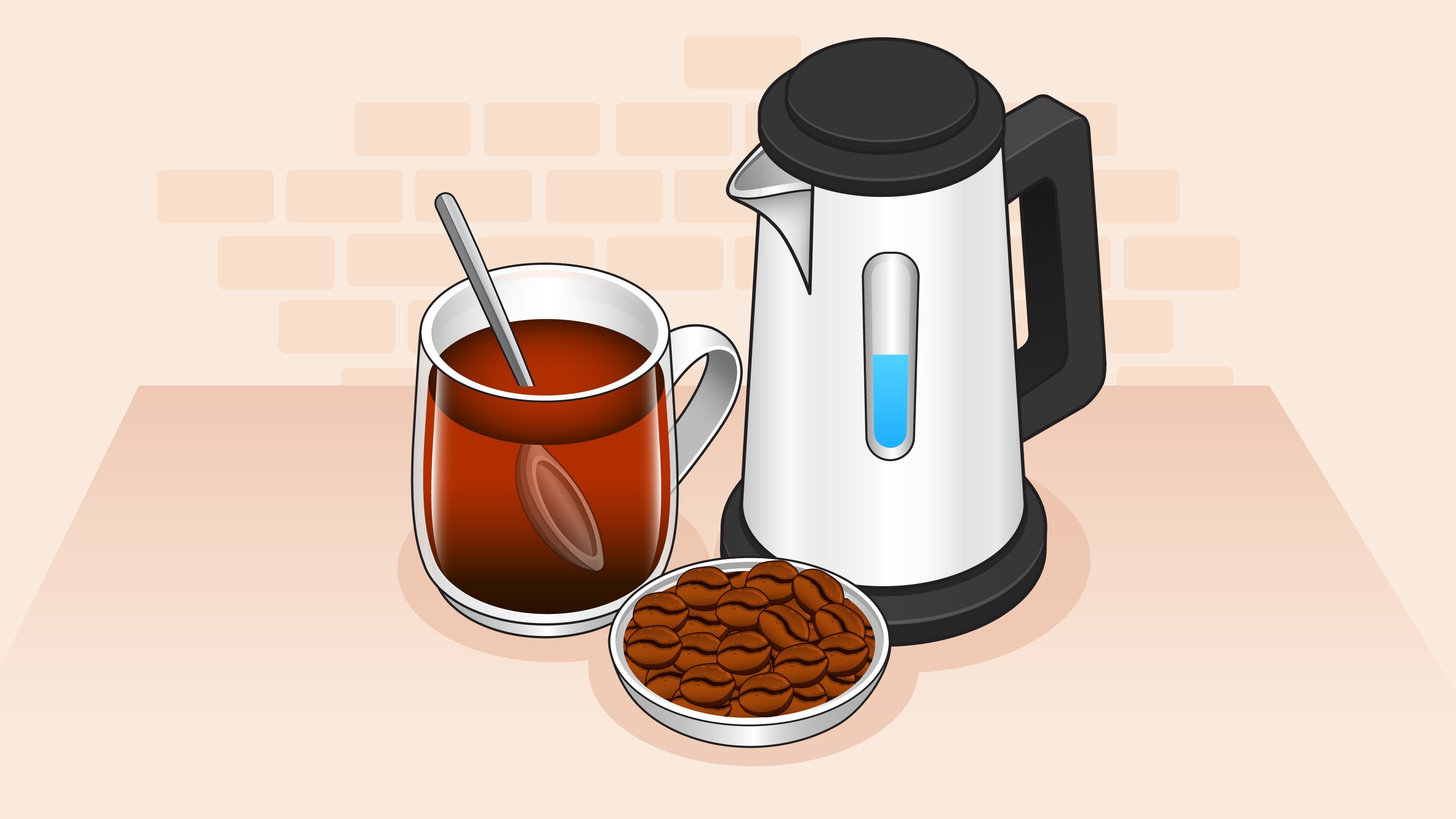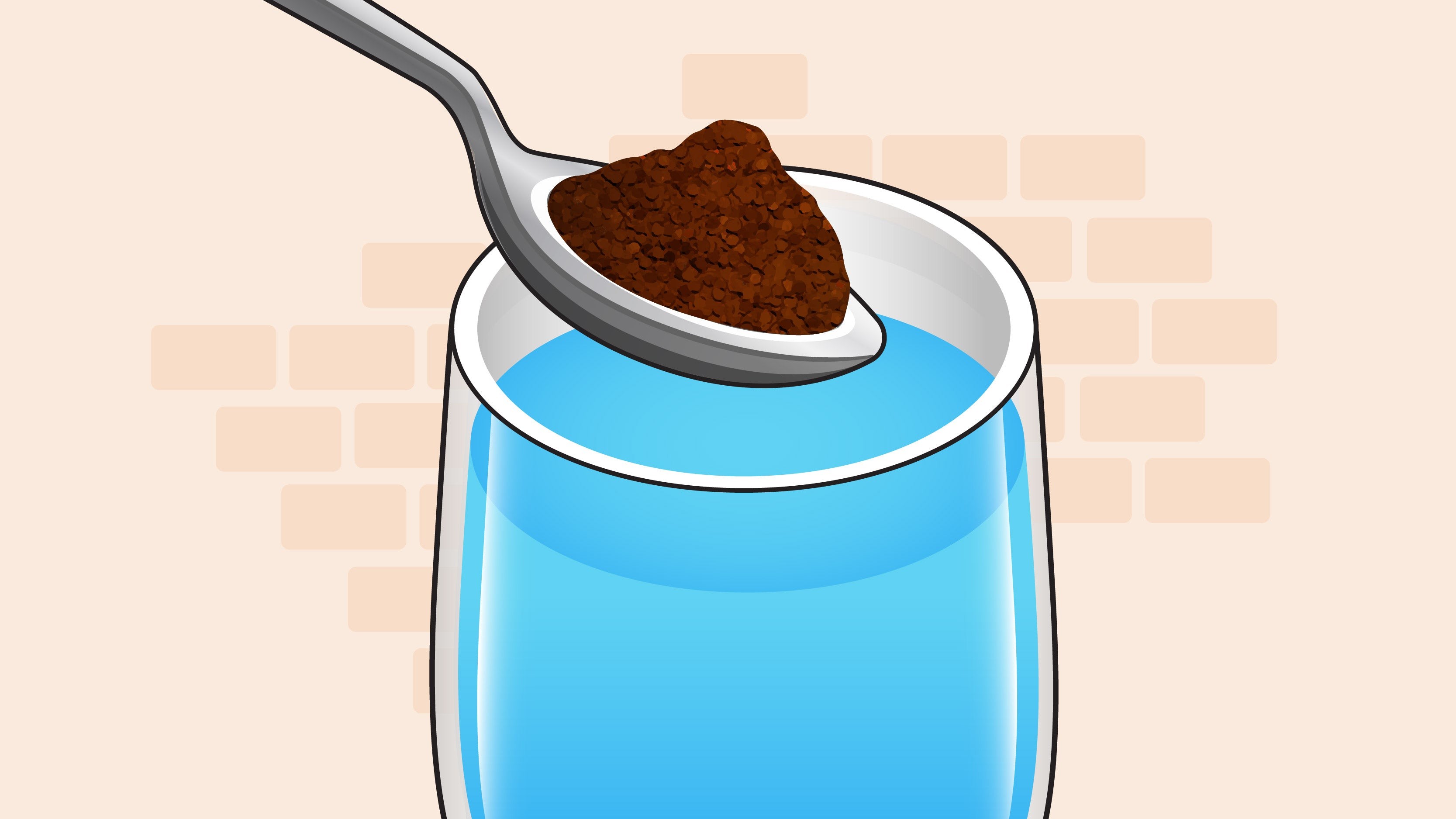Nescafé instant coffee caffeine content is a common question for coffee lovers. At HOW.EDU.VN, we provide expert insights into the varying levels of caffeine in Nescafé and other instant coffee brands, ensuring you know exactly what you’re consuming. Understanding these caffeine levels helps you make informed choices about your daily intake, balancing the stimulating effects with your health needs. Explore with us the factors influencing caffeine levels, comparing brands, and understanding the health considerations.
1. Understanding Caffeine Content in Instant Coffee
The caffeine content in instant coffee typically ranges from 30 to 100 mg per serving. However, premium brands, such as those using Vietnamese Robusta coffee, may contain up to 150 mg. The broad range exists because there is no standardized formulation for instant coffee, and caffeine concentration depends on several factors.
1.1. Factors Affecting Caffeine Levels
Several elements influence the caffeine content in your cup of instant coffee. Understanding these factors helps manage your caffeine intake:
- Type of Coffee Bean: Arabica beans have less caffeine than Robusta beans.
- Roasting Process: Dark roasts may have slightly less caffeine than light roasts.
- Production Method: Freeze-dried coffee often retains more caffeine than spray-dried coffee.
- Dosage: The amount of instant coffee powder used directly affects the caffeine level.
1.2. Comparing Instant Coffee to Brewed Coffee
Comparing instant coffee to freshly brewed coffee helps you appreciate the nuances in caffeine levels:
- Brewed Coffee (8 oz): 80-100 mg of caffeine
- Decaffeinated Brewed (8 oz): 2 mg of caffeine
- Cold Brew (8 oz): Approximately 100 mg of caffeine
- Espresso (1 oz shot): Around 75 mg of caffeine
- Instant Coffee (8 oz): Varies from 30-150 mg of caffeine
2. How Much Caffeine is in Nescafé Instant Coffee?
Nescafé is a popular brand, and its caffeine content varies across its product range. Here’s a closer look at some Nescafé products:
- Nescafé Gold: Contains approximately 50 mg of caffeine per serving.
- Nescafé Blend 43: Offers around 90 mg of caffeine per serving.
These values provide a general idea, but always check the packaging for specific information.
2.1. Nescafé Product Analysis
Analyzing specific Nescafé products provides clarity:
| Nescafé Product | Caffeine Content (approx.) |
|---|---|
| Nescafé Gold | 50 mg |
| Nescafé Blend 43 | 90 mg |
| Nescafé Classic | 65 mg |
| Nescafé Azera | 80 mg |



2.2. Factors Specific to Nescafé
Nescafé’s caffeine content is influenced by its bean sourcing and production processes. For example, Nescafé uses a blend of Arabica and Robusta beans, impacting the caffeine levels. The company’s roasting and drying techniques also play a crucial role.
3. Detailed Look at Caffeine and Its Impact
Caffeine is a stimulant that affects the central nervous system. Understanding its effects can help you manage your consumption:
- Increased Alertness: Caffeine enhances alertness and reduces fatigue.
- Enhanced Focus: It improves concentration and mental performance.
- Physical Performance: Caffeine can boost endurance and physical stamina.
3.1. Benefits of Moderate Caffeine Consumption
Moderate caffeine intake can have several health benefits:
- Reduced Risk of Diseases: Studies suggest coffee consumption can lower the risk of Parkinson’s and Alzheimer’s disease.
- Improved Metabolic Health: Caffeine may help in managing diabetes.
- Asthma Relief: Some studies indicate that caffeine can alleviate asthma symptoms.
3.2. Potential Side Effects of Excessive Caffeine
Consuming too much caffeine can lead to adverse effects:
- Insomnia: Difficulty in falling asleep.
- Anxiety: Increased feelings of nervousness and unease.
- Jitters: Shakiness and restlessness.
- Fast Heart Rate: Elevated heart rate.
- Upset Stomach: Digestive issues and discomfort.
- Headaches: Caffeine withdrawal can cause headaches.
4. Instant Coffee Production: How It Affects Caffeine
The process of turning brewed coffee into instant coffee significantly affects the caffeine content. Manufacturers typically use two primary methods:
- Spray Drying: This involves spraying concentrated coffee into hot air, causing water to evaporate and leaving dried granules.
- Freeze Drying: Here, brewed coffee is frozen, and ice is vaporized, resulting in a powder.
4.1. Spray Drying vs. Freeze Drying
Spray drying often results in lower caffeine content because the high temperatures can degrade caffeine. Freeze drying generally preserves more caffeine, offering a stronger flavor and higher caffeine levels.
4.2. Impact of Production on Caffeine Levels
The Journal of Food Science found that spray-dried coffee can lose up to 25% of its caffeine content compared to freeze-dried coffee. This difference is crucial for consumers seeking a specific caffeine level.
5. Comparing Popular Instant Coffee Brands
Understanding how different brands stack up in terms of caffeine content can help you choose the right product. Here’s a comparison of some popular brands:
| Brand | Caffeine Content (per serving) |
|---|---|
| Cafely Instant Coffee | 150 mg |
| Starbucks Via | 135 mg |
| Alpine Start | 120 mg |
| Tasters Choice | 98 mg |
| Nescafé Blend 43 | 90 mg |
| Waka Colombian | 70 mg |
| Mount Hagen | 70 mg |
| Moccona (Douwe Egberts) | 60 mg |
| Nescafé Gold | 50 mg |
5.1. Cafely Instant Coffee: A Stronger Alternative
Cafely Instant Coffee stands out with its high caffeine content, delivering 150 mg per serving. This is achieved by using high-grade Vietnamese Robusta beans, known for their strong flavor and high caffeine concentration.
5.2. Understanding Brand Labels
Always read the labels on your coffee packets to understand the caffeine content. Brands are increasingly providing detailed nutritional information to help consumers make informed decisions.
6. Health-Conscious Coffee Consumption
Consuming coffee responsibly involves understanding your body’s tolerance and moderating your intake. Here are some tips:
- Monitor Your Intake: Keep track of how much caffeine you consume daily.
- Stay Hydrated: Drink plenty of water to counteract the diuretic effect of caffeine.
- Avoid Late-Day Consumption: Refrain from drinking coffee in the evening to prevent sleep disturbances.
- Listen to Your Body: Pay attention to how caffeine affects you and adjust your consumption accordingly.
6.1. Healthy Ways to Enjoy Coffee
Enjoying coffee in a healthy way involves mindful consumption:
- Limit Added Sugars: Reduce the amount of sugar in your coffee to avoid excess calories.
- Choose Low-Fat Milk: Opt for skim or low-fat milk to reduce fat intake.
- Avoid Artificial Sweeteners: Use natural sweeteners like stevia or monk fruit in moderation.
6.2. When to Consult a Healthcare Professional
If you experience adverse effects from caffeine, consult a healthcare professional. People with heart conditions, anxiety disorders, or pregnant women should seek medical advice regarding caffeine consumption.
7. Instant Coffee Around the World
Instant coffee is a global phenomenon, with varying levels of popularity in different regions. It’s particularly popular in Asia and Europe due to its convenience and affordability.
7.1. Reasons for Instant Coffee’s Popularity
Instant coffee’s popularity stems from several factors:
- Convenience: It’s quick and easy to prepare, requiring only hot water.
- Affordability: Instant coffee is generally cheaper than freshly brewed coffee.
- Shelf Life: It has a long shelf life, making it ideal for occasional coffee drinkers.
7.2. Cultural Variations in Coffee Consumption
Different cultures have unique ways of enjoying instant coffee. In some countries, it’s mixed with milk and sugar, while in others, it’s consumed black. These cultural variations also influence the perceived benefits and drawbacks of instant coffee.
8. Debunking Common Myths About Instant Coffee
Several myths surround instant coffee, often painting it as an inferior alternative to brewed coffee. Let’s debunk some common misconceptions:
- Myth: Instant coffee tastes bad.
- Fact: Modern instant coffee production has significantly improved the taste. Premium brands offer rich and satisfying flavors.
- Myth: Instant coffee has no health benefits.
- Fact: Instant coffee retains many of the health benefits of brewed coffee, including antioxidants and potential protection against certain diseases.
- Myth: Instant coffee is always low in caffeine.
- Fact: As demonstrated by brands like Cafely, instant coffee can have high caffeine levels, comparable to or even exceeding those of brewed coffee.
8.1. Addressing Misconceptions About Quality
Modern techniques ensure that instant coffee retains much of the flavor and aroma of freshly brewed coffee. Brands focus on sourcing high-quality beans and employing advanced drying methods to deliver a superior product.
8.2. Understanding the True Nutritional Profile
Instant coffee contains antioxidants and other beneficial compounds found in brewed coffee. While it may lack some of the nuanced flavors, it still offers notable health benefits.
9. Innovative Instant Coffee Products
The instant coffee market is continuously evolving, with innovative products catering to diverse consumer preferences.
9.1. Flavored Instant Coffees
Flavored instant coffees, such as Cafely’s Instant Vietnamese Coconut Coffee, offer a unique twist to traditional coffee. These products combine the convenience of instant coffee with exciting flavor profiles.
9.2. Instant Coffee with Added Benefits
Some instant coffee products are enhanced with additional ingredients like vitamins, minerals, or adaptogens to provide added health benefits. These products cater to consumers seeking a functional beverage that supports overall well-being.
10. Future Trends in Instant Coffee
The future of instant coffee looks promising, with several trends shaping the market:
- Sustainability: Brands are increasingly focusing on sustainable sourcing and eco-friendly packaging.
- Specialty Instant Coffee: The rise of specialty instant coffee caters to consumers seeking high-quality, artisanal coffee experiences.
- Personalization: Customizable instant coffee blends allow consumers to tailor their caffeine intake and flavor preferences.
10.1. Focus on Sustainability
Consumers are increasingly demanding sustainable and ethically sourced coffee. Brands are responding by implementing responsible sourcing practices and reducing their environmental impact.
10.2. Rise of Specialty Instant Coffee
Specialty instant coffee offers a premium alternative to traditional instant coffee. These products focus on high-quality beans, unique roasting profiles, and innovative production methods to deliver an exceptional coffee experience.
11. Expert Advice on Choosing Instant Coffee
Choosing the right instant coffee involves considering your preferences, caffeine tolerance, and health goals. Here’s some expert advice:
- Read Labels: Pay attention to caffeine content and ingredient lists.
- Consider Bean Type: Choose Arabica for a milder flavor and lower caffeine, or Robusta for a stronger flavor and higher caffeine.
- Look for Quality Certifications: Seek out products with certifications like Fair Trade or Organic to ensure ethical sourcing.
11.1. How to Read Coffee Labels
Understanding coffee labels helps you make informed decisions:
- Caffeine Content: Look for the milligrams of caffeine per serving.
- Ingredient List: Check for added sugars, artificial flavors, and preservatives.
- Origin: Consider the origin of the beans, as different regions offer unique flavor profiles.
11.2. Understanding Different Bean Types
Different bean types offer distinct flavor profiles and caffeine levels:
- Arabica: Known for its smooth, aromatic flavor and moderate caffeine content.
- Robusta: Offers a strong, bold flavor and high caffeine content.
- Blends: Many brands use a blend of Arabica and Robusta beans to balance flavor and caffeine levels.
12. FAQs: Instant Coffee
12.1. How much caffeine is in a teaspoon of instant coffee?
The caffeine content of instant coffee varies, but you can assume approximately 62 mg per teaspoon, depending on the brand and coffee concentration.
12.2. Is instant coffee less caffeinated than brewed coffee?
Yes, most instant coffee contains less caffeine than brewed coffee, due to the processes involved in turning freshly brewed coffee into instant form.
12.3. Can you control the caffeine content in instant coffee?
Yes, by adjusting the amount of powder used in your cup of instant coffee, you can control how much caffeine you are consuming.
12.4. What is the safest amount of instant coffee you can consume daily?
The FDA recommends restricting your coffee consumption to 400 mg of caffeine per day, which equates to about 4-5 standard cups of instant coffee.
12.5. Does the flavor of instant coffee affect its caffeine content?
No, the flavor of instant coffee does not affect caffeine content, but the type of coffee bean and its roast does. Robusta beans have twice as much caffeine as arabica coffee, and a lighter roast generally contains more caffeine.
12.6. Are there low-caffeine instant coffee options available?
Yes, several brands offer low-caffeine or decaffeinated instant coffee options. For example, Cafely’s DeLat Coffee uses 100% arabica beans, which are lower in caffeine than robusta.
12.7. How does the caffeine in Cafely Instant Vietnamese Coconut Coffee compare to other brands?
Cafely’s Instant Vietnamese Coconut Coffee is flavored with coconut milk and uses monk fruit to counteract the robustness of the blend. At 150 mg per serving, it’s significantly higher than the average for instant coffees.
12.8. What are the health benefits of moderating caffeine intake?
Limiting your caffeine intake to 400 mg a day reduces the risk of anxiety, insomnia, digestive issues, and long-term effects.
12.9. How does instant coffee’s caffeine content affect its taste?
High caffeine levels offer coffee drinkers a stronger, more intense flavor. However, too much caffeine can cause your coffee to become bitter. Cafely’s coffees have a touch of monk fruit, which counteracts the bitterness of caffeine.
12.10. Are there any instant coffees with caffeine levels comparable to an energy drink?
Some high-caffeine instant coffees approach the caffeine levels found in energy drinks. All of Cafely’s Instant Coffees provide you with 150 mg of caffeine per packet.
13. Discover Expert Coffee Advice at HOW.EDU.VN
Navigating the world of coffee and caffeine can be complex. At HOW.EDU.VN, we connect you with leading experts to provide personalized advice tailored to your needs. Whether you’re curious about the specific caffeine content in Nescafé or seeking guidance on health-conscious coffee consumption, our team of over 100 PhDs is here to assist.
13.1. How HOW.EDU.VN Can Help You
- Personalized Consultations: Connect directly with experts for customized advice.
- Comprehensive Information: Access detailed articles and guides on coffee, caffeine, and related health topics.
- Expert Insights: Benefit from the knowledge and experience of our team of PhDs.
13.2. Connect with Our Experts Today
Don’t navigate the complexities of coffee and caffeine alone. Contact HOW.EDU.VN today for expert guidance and personalized advice.
Address: 456 Expertise Plaza, Consult City, CA 90210, United States
WhatsApp: +1 (310) 555-1212
Website: HOW.EDU.VN
14. References
- Bell, D. G., & McLellan, T. M. (2002). Exercise endurance 1, 3, and 6 h after caffeine ingestion in caffeine users and nonusers. Journal of Applied Physiology, 93(4), 1227-1234.
- Goldstein, E. R., Ziegenfuss, T., Kalman, D., Kreider, R., Campbell, B., Wilborn, C., … & Antonio, J. (2010). International Society of Sports Nutrition position stand: caffeine and Performance. Journal of the International Society of Sports Nutrition, 7, 1-15.
- Chen, J. Q., Scheltens, P., Groot, C., & Ossenkoppele, R. (2020). Associations between caffeine consumption, cognitive decline, and dementia: a systematic review. Journal of Alzheimer’s Disease, 78(4), 1519-1546.
- Welsh, E. J., Bara, A., Barley, E., & Cates, C. J. (2010). Caffeine for asthma. Cochrane database of systematic reviews, (1).
Are you struggling to find reliable information about coffee and caffeine? Do you need expert advice tailored to your health and lifestyle? At HOW.EDU.VN, we understand these challenges and offer a solution. Our team of over 100 PhDs is ready to provide personalized consultations and comprehensive guidance. Contact us today and experience the benefits of expert-driven insights. Don’t let uncertainty cloud your coffee enjoyment – let how.edu.vn be your trusted source for all things coffee and caffeine.